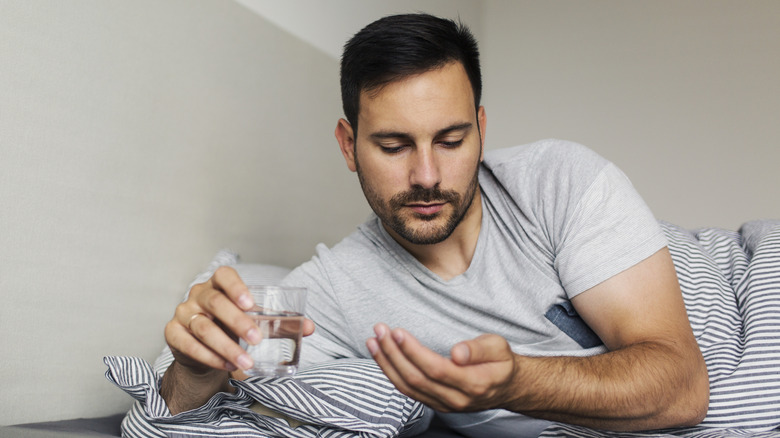When You Take Zinc And Magnesium Together, Here's What Happens To Your Sleep
Getting enough sleep is critical to your physical and mental wellbeing. Yet the National Center for Health Statistics says that millions of adults in the United States are hampered nightly by sleep disorders. This means many people face the morning feeling restless, exhausted, and frustrated. And their troubles don't end there; after starting their days, they then have to face the relentless side effects of sleep deprivation.
Maybe you can relate, especially if you consistently experience moodiness, snack cravings, and other unpleasant symptoms that happen to your body when you're not sleeping enough. In that case, you may have considered which nutritional supplements might help you get a quality snooze. According to some clinical experiments, zinc and magnesium could be worth a try.
For instance, a 2024 review in Health Science Reports examined eight studies that focused on the possible effects of zinc on sleep in human subjects. The review found a possible correlation between taking zinc and improved sleep quality. However, because of the variations between the duration of the studies and the zinc doses, more investigation may be warranted.
Relationships between zinc, magnesium, and sleep
Zinc may contribute to sleep in ways other than just quality. A 2017 review in the International Journal of Molecular Sciences determined that taking zinc could help regulate the sleep process by encouraging faster sleep onset. That said, the review relied upon several animal study models, and animals may be affected by zinc differently than humans.
Magnesium, on the other hand, seems to have been examined more frequently, allowing for more in-depth analysis of its possible implications as a sleep aid. As noted in a 2021 study in Sleep, regular magnesium consumption was associated with higher sleep quality and longer sleep duration for adults without depression.
Recently, TikTok has made the magnesium-packed "sleepy girl mocktail" a viral social media craze among insomniacs. (Read about what happened when we tried the sleepy girl mocktail.) The sleepy girl mocktail features magnesium as its primary sleep agent, along with glycine, tart cherry juice, and a non-alcoholic mixer like soda water. "Magnesium glycinate is a well-regarded supplement known for its potential to contribute to better sleep," per board-certified psychiatrist Dr. Faisal Tai (via WebMD).
Partnering other sleep agents with zinc and magnesium
Magnesium and zinc aren't 100% guaranteed to give you a better night's rest, so you may want to try augmenting them with another all-natural nutrient, such as tart cherry juice (also known for its sleep-inducing potential, which is just one of the reasons to consider drinking it every day) or the widely used melatonin.
The idea of bringing melatonin into the zinc-magnesium sleep mix has been investigated before with decent results. In a 2011 trial in the Journal of the American Geriatrics Society, adults with insomnia who took zinc, magnesium, and melatonin one hour before bed for eight weeks reported higher qualities of sleep. They also felt less of a "sleep hangover" and were more alert in the morning.
You might also see some sleep aid supplement products that pair vitamin B6 with zinc and magnesium or a magnesium derivative like magnesium sulfate. Whether or not this combination will work is debatable, though. A 2024 study published in Nutrients found that taking zinc, magnesium sulfate, and vitamin B6 for two nights produced no significant effects on sleep in partially sleep-deprived male subjects. Consequently, you may be better off trying zinc and magnesium alone or with melatonin to get a more satisfying level of evening snooze.



